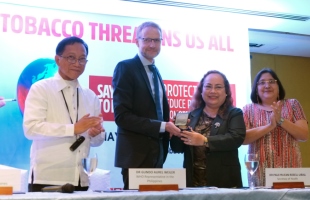
The World Health Organization (WHO) conferred the prestigious 2017 World No Tobacco Day Award to Department of Health (DOH) Secretary Dr Paulyn Jean B. Rosell-Ubial for her strong tobacco control advocacy in the Philippines. Secretary Ubial is one of six awardees in the Western Pacific Region.
The theme for this year’s World No Tobacco Day is “Tobacco: a Threat to Development.” Every year, on World No Tobacco Day, WHO recognizes individuals and organizations around the world that are doing exceptional work in tobacco control. WHO Country Representative in the Philippines Dr Gundo Weiler said, “We congratulate Secretary Ubial for this well-deserved recognition. She is always on the forefront in saying no to tobacco to protect health, reduce poverty and promote development.”
Secretary Ubial has consistently advocated for tobacco control throughout her long-standing career in public health. In 2010, she helped conceptualize the Red Orchids Awards, DOH’s 100% Tobacco Free Environment recognition for local government units, government offices and government hospitals all over the country.
Upon her appointment by President Rodrigo Duterte as the Secretary of Health, Dr Ubial prioritized drafting an executive order banning smoking in public places nationwide. This executive order was eventually signed by the President on 16 May 2017.
“The signing of Executive Order 26 is a step in the right direction in the Philippines’ implementation of the WHO Framework Convention on Tobacco Control,” said Weiler. “It improves upon the Republic Act 9211 and shows the sincere commitment of the government to protecting the public from carcinogenic second-hand smoke.”
Strong tobacco control measures in the Philippines, such as the Sin Tax Law, have resulted in a one-fifth decrease of smokers among Filipino adults – from 29.7 percent in 2009 to 23.8 percent in 2015. Second-hand smoke exposure in homes and in the workplace has also declined significantly. Today, there are 1 million less smokers in the Philippines.
“With 10 Filipinos dying prematurely from tobacco-related diseases every hour, all efforts to reduce tobacco consumption and strengthen tobacco control directly benefits individuals, societies, and helps the Philippines achieve its Sustainable Development Goals, resulting in a healthier population,” explained Weiler. “Aside from ensuring healthy lives, smoking bans also make workplaces and public spaces safer for all.”
“We will continue to work closely with government towards its universal commitments to end poverty, protect the planet, and promote peace and prosperity,” he adds.
The Sustainable Development Goals (SDGs) has 17 goals and 169 targets to ensure that no one is left behind in transforming a better world for all by 2030. The SDG on health makes specific reference to the full implementation of the Framework Convention on Tobacco Control. The Philippines is one of the 193 UN Member States which adopted the SDGs in 2015.
This year’s theme for World No Tobacco Day (WNTD), “Tobacco – a threat to development”, makes explicit the crucial and very real link between tobacco and SDGs. This is a powerful line that we should proclaim loudly and with greater vigour, to save lives, to save our family.
